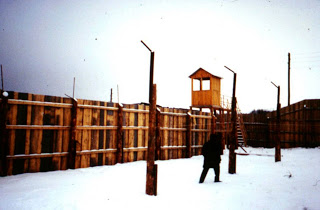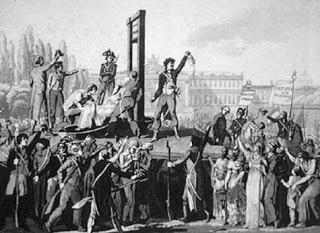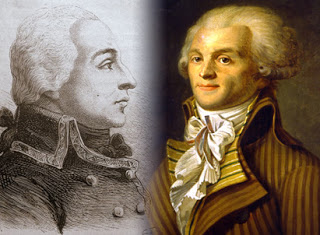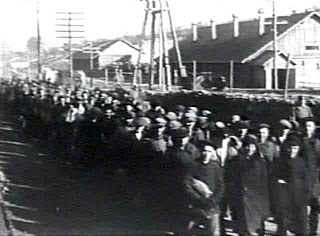The Gulag State, Take Two: Breyer Proposes an American “Law of Suspects”

“
For several centuries we had a proverb: `Don’t fear the law, fear the judge. But, in my opinion, the law has outstripped people, and people have lagged behind in cruelty. It is time to reverse the proverb: `Don’t fear the judge, fear the law.’”
Alexander Solzhenitsyn, The Gulag Archipelago
There are occasions when I wonder if the world-historic purpose of the Soviet Union’s 74-year existence was to provide a first draft for the terror state our own rulers are constructing. Last week’s oral arguments regarding the suspension of habeas corpus – in particular, a colloquy between Justice Stephen Breyer and Solicitor General Paul Clement – was one such occasion.
Breyer, a veteran of the ACLU, is regarded by GOP-aligned conservatives to be a near-perfect specimen of left-wing judicial activism. Yet in discussing the case of Boumediene v. Bush, which challenges the open-ended detention, without trial, of several foreign nationals at Gitmo, Breyer appeared amenable to a legislative solution, rather than determined to impose the will of the High Court. Indeed, according to Newsweek‘s account, Breyer all but begged Congress to intervene, indicating three times “that it would be possible for Congress to enact a law that would provide the basis for holding the detainees indefinitely without trial.”
Breyer’s specific suggestion to Clement was that “long-term detention might pass muster with the Supreme Court under `some special statute involving preventive detention and danger, which has not yet been enacted.’”
Apparently, it isn’t enough that the Military Commissions Act (MCA) eviscerated the habeas corpus guarantee, which is the indispensable foundation of the Anglo-Saxon system of individual liberty under law. It is insufficient for the Bush Regime to embrace a despotic vision under which the Chief Executive can consign specific individuals to prison in perpetuity, with no prospect of parole.
Breyer is suggesting that Congress needs to refine this crude pre-medieval practice into a system of pure totalitarian tyranny by institutionalizing preventive detention – and that the Court would be amenable to such a solution. Don’t be surprised if Congress acts on that suggestion.
What Breyer seems to be seeking is a measure permitting the government to seize, and imprison forever, anyone it deems to be “dangerous.” The MCA already codifies the supposed authority of the president to detain individuals designated terrorists or “unlawful combatants.” Under a measure of the sort suggested by Breyer, the threshold for imprisonment would be much lower, and mass incarceration of “dangerous” people would become an acute possibility.

The notion of preventive detention of “dangerous” people is entirely foreign to the American concept of law, which is rich in impediments – such as the Constitution’s proscription of bills of attainder and expropriations based on “corruption of blood” — to arbitrary incarceration or punishment of people who have broken no laws.
Breyer’s suggestion – which was made in all apparent seriousness, and with some urgency – is inspired by a more “modern” legal tradition with its origins in the bloodiest phase of the French Revolution.
What Breyer seems to have in mind is a contemporary version of the 1793 “Law of Suspects” enacted by France’s ruling junta at the depth of the revolutionary terror, or Article 58 of the Soviet Basic Penal Code.
The Law of Suspects was enacted by decree on September 17, 1793 (ironically, the sixth birthday of the U.S. Constitution). The decree permitted the wholesale imprisonment of six classes of people deemed enemies of the State:
*Those deemed “partisans of tyranny” or “enemies of liberty” — which in the Jacobin context meant defenders of the monarchy and traditional institutions;
*Individuals who had been denied “certificates of patriotism” issued by the revolutionary regime;
*Former “civil servants” who had been cashiered by the National Convention;
*Former nobles and emigres and their families, if they failed to offer constant displays of “devotion to the Revolution”;
*Those who emigrated from France between July 1, 1789 and April 8, 1792.
Promulgation of the Law of Suspects is generally recognized as the beginning of the Revolution’s most radical phase. It “brought forth both the levee en masse [general conscription] and the Terror,” points out David A. Bell of Johns Hopkins University in his new book The First Total War: Napoleon’s Europe and the Birth of Warfare as We Know It.
The strong arm, and the sinister brain, of the Revolutionary Terror: Alsatian General Francois-Joseph Westermann (left) liquidated tens of thousands in the Vendee, in furtherance of the terrorist designs of Maximilien Robespierre (right).
That year also saw the beginning of the civil war in the Vendee, a conflict that began after the traditional Catholic residents of that department rebelled against the conscription of their sons to fight against other Catholics abroad on behalf of an anti-clerical government. The war against the Vendee would prefigure modern totalitarian wars of extermination from Soviet Russia to Khmer Rouge-dominated Cambodia: Hundreds of thousands were slaughtered in campaigns that included mass drownings (called “republican baptisms”) and even through crude chemical and biological warfare.
The Law of Suspects was central to a system of “laws” intended to legitimize such systematic murder. It was enforced by a Committee of General Security, which acted through local Committees of Surveillance and enforced its rulings through a Revolutionary Tribunal (and its local appendages).
In the Vendee, counterrevolutionaries – whether militia or civilians – were often subject to summary execution as unlawful combatants by military commissions.
It’s hardly coincidental that Lenin and his squalid little clique of murderers and perverts drew inspiration from the Jacobin campaign against the Vendee. And in 1922 the Bolsheviks created their own Law of Suspects by creating a Commission on “exiles” — meaning people to be deported to the embryonic Gulag Archipelago – and then issuing a law against “socially dangerous persons” in Article 58 of the Basic Penal Code.
“Monsieur Henri,” the youthful leader of the Christian forces in La Vendee
Article 58 was the legal foundation for the Gulag state created under Lenin, perfected under Stalin, and that remains, in residual form, today in post-Soviet Russia. It was the purebred offspring of the Jacobin Law of Suspects. And if Congress acts on Justice Breyer’s urgent advice to enact a law for the preventive detention of “dangerous” people, America will have completed its legal transition to a Soviet-style gulag state: It will only be a matter of time before the camps are built and filled with “socially dangerous” people.
Consider this: There are roughly 120,000 people who are either on the Regime’s “No-Fly List,” or subject to detention and additional scrutiny at airports. These are “dangerous” people who are already subject to a form of preventive detention, albeit of an annoying, rather than potentially lethal, variety.
Consider this, as well: Under a July 17 executive order, the Wee Emperor claimed the right to expropriate those individuals that he and his subordinates believe are interfering with the war effort in Iraq. Shocking as this is, it falls well short of the powers Justice Breyer’s proposal would confer. But summary expropriation occupies the same continuum as summary imprisonment, and outlawing domestic political opposition by decree is unmistakably akin to the logic of the Law of Suspects.
Bush and Breyer appear to be working from different paragraphs on the same page — or on different sections of the same totalitarian blueprint. If you want a peek at what their project will look like when it’s done, you’d better brush up on your Solzhenitsyn.
Dum spiro, pugno!
Content retrieved from: http://freedominourtime.blogspot.com/2007/12/gulag-state-take-two-breyer-proposes.html.






























